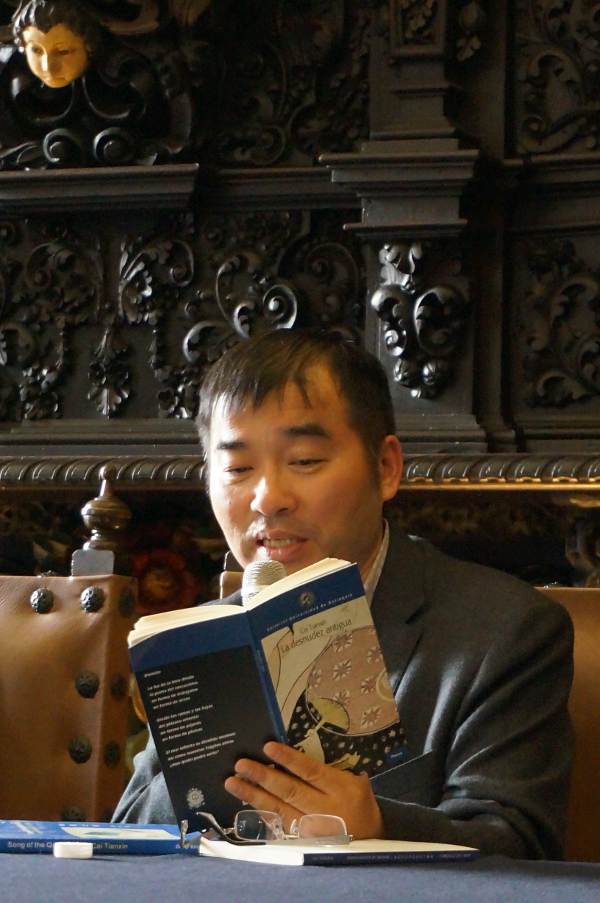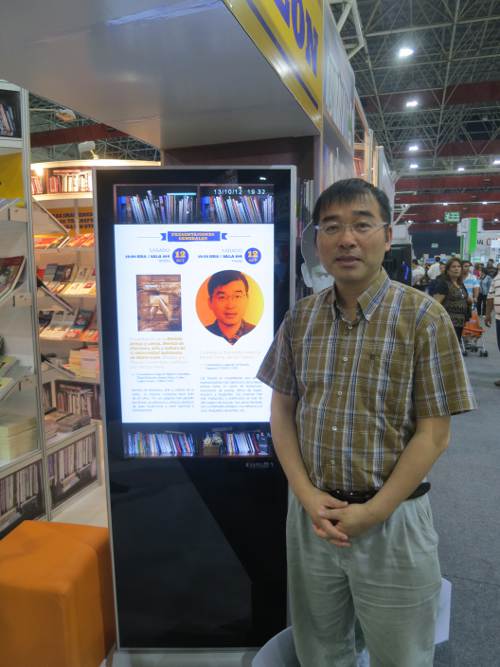Interview with Cai Tianxin
If the mathematician is the poet of rationalism, then the poet is the mathematician of irrationalism.
Julio C. Palencia had a conversation with Chinese mathematician and poet Cai Tianxin.
Julio Palencia: Throughout October you have been holding readings of your poems in several Latin American countries: Mexico, Colombia, Peru, to name a few. Which of those readings could be considered as the most memorable, and which were the ones with the highest attendance?
Cai Tianxin: I only stayed at Bogota Airport for a couple of hours, and during that time I wrote half a dozen of poems. I spent a year in the beginning of the century in Latin America. I think the most impressive reading was at El Colegio De Mexico, with Professor Liliana; she is the interpreter for the meetings between Chinese President Xi Jinping and the Mexican President. She also accompanied the two presidential couples to Merida and Chichen Itza, half of the audience knew Chinese; some spoke fluently and knew Chinese poetry quite well. Meanwhile, I enjoyed my reading at the poetry festival in Mexico City as well as joint readings with students in Chinese classes at UNAM, UANL(Monterey) and PUCP(Lima).
JP: In 1995, you began to edit the biannual literary magazine ‘Apollinaire’, which late turned into one of the most important underground magazines in China. . The first issue said “We Salute Apollinaire!” below a reproduction of a 1913 portrait of the French poet. Can you please say more on the intention behind the first issue’s statement, as well as on your choice of the poet for the name of the magazine?
Cai Tianxin: I visited Paris for the first time in 1995. I chose Apollinaire for the magazine, because he is not only a poet I like, but also a playwright, short story writer, novelist, and critic. His name and the pronunciation of it in Chinese are both beautiful; besides, I really liked French poetry at that time. If I came to Latin American earlier than that, things might have been different.
JP: There are two interrelated texts written by you that I have been paying a great deal of attention to: the first one is an article, Mathematicians and Poets, and the second one is a poem, The Number and the Rose. Even though they both get the same idea across, their literary structure is different. Is the poet inevitably linked to the rose, and numbers linked to mathematics; could the rose be mathematical, and numbers poetic?
Cai Tianxin: Yes, you are really right on. The poem The Number and the Rose, which I wrote in Medellin Columbia in 2000, is dedicated to the great Greek mathematician Pythagoras, in his eyes, the numbers were roses of different colours, red, white, yellow…
JP: Continuing on the ideas of Mathematicians and Poets, you say that mathematicians and poets are at the core of inspiration and dreams, one gravitating towards abstract thoughts, and the other towards the realm of the concrete. In consideration of this, you are also both a mathematician and a poet. To quote Spanish philosopher Maria Zambrano, “Abstraction is a type of look that has stopped seeing things”, what do you think about that?
Cai Tianxin: What we can say is that abstraction is becoming more like our daily life; the modern world is getting more and more abstract, so is the relationship between human beings (colleagues, neighbours, etc.). I think from the viewpoint of philosophy Maria is right, but from the viewpoint of mathematics or poetry she may be wrong. I know her hometown is Malaga, the same as Picasso; after a bus trip there I found that the railway station was named after her, which I found a pity as I felt it should have been named for Picasso.
JP: Has mathematics left poetry –ever so rebellious and condemned, ignored and abandoned in underground corridors– now that science and progress depend so much on numbers?
Cai Tianxin: It seems like it has, but as a matter of fact, pure mathematicians for example- number theorists like me- are away from the modern world, they are close to the classic masters. Ezra Pound once said something to the effect that the more classic something is, the more modern it is. The poets are not alone at all.
JP: You have a post-graduate degree in Number Theory, and you are a professor at the prestigious Zhejiang University in China, this leads me to my next question. In Philosophy and Poetry, María Zambrano wrote that “Any mathematical formula is but a desperate attempt to capture the song of things”. What do you think about that statement?
Cai Tianxin: Haha! I have met her again! This time around I find that Maria is not as fond of mathematics as she is with poetry, maybe this is a trend from her high school days; therefore she can’t let it go, even when she became famous. Things are similar in China, many people dislike mathematics, they will tell me this as if it is not a shame for him or her at all.
JP: The poet wants to feel everything, to become entangled in the rain and in the leaves of trees. The poet builds the unity of his world through the physical appearance of things. This is indeed the same poet expounded upon by Plato in Myth of the Cave. Is the mathematician the poet of rationalism?
Cai Tianxin: Maybe you are right, maybe not. Like the poets, mathematicians also think their world is the whole world. But if the mathematician is the poet of rationalism, then the poet is the mathematician of irrationalism. This again, may be wrong. For the modern poet, I think that he also needs to be rational.
JP: How do mathematics and poetry –numbers and roses– communicate with each other inside Cai Tianxin?
Cai Tianxin: I think they are the two freest forms of intelligent activities; all we need is a pen and a paper. I think it is harder to be a chemist and a poet at the same time than to be a mathematician and poet at the same time. Neither of us, the poet nor the mathematician, need to do any experimentation.
JP: Translation is a path of knowledge and joy. You have translated into Chinese the works of Jorge Luis Borges, Gabriel Garcia Marquez, Octavio Paz, Antonio Porchia, Alejandra Pizarnik, Elizabeth Bishop and Margaret Atwood. How do you decide that you want to translate something, and what triggers that intellectual need?
Cai Tianxin: So far I have only published a book of poems and essays translated from North and South America, and hopefully will have another book of poems and essays translated from Europe. I am not a concentrated translator. When I find a new and interesting poet- maybe his poems, maybe his life or both- then I would find some of his or her work and translate it.
JP: The world has indeed shrunk for you; you are a great traveller. A Chinese poet has said: “A writer is shaped by the distance he travels… Cai’s distances are metaphysical.” How much of these travels seep into your poetry?
Cai Tianxin: I believe that in our times no one could be a Shakespeare or Newton; the finite world on the map is exactly designed for our finite life. However, we can make use of modern transportation as a tool to reach the place we want to see. In the past 20 years, I wrote most of my poems on the way from one place to another. I often say that the family style of life fits that of prose writing, and the single life fits poetry writing.
JP: What can you tell us about the Chinese poetry of our times? What are the topics that attract or concern contemporary Chinese poets today?
Cai Tianxin: The population in China is 10 times as much as in Mexico, so I think the amount of Chinese poets are also around 10 times as much; the topic of poems from both countries are similar. However, even in one country, the style of poems from north to south, on the coast or in the interior, are different.
JP: By the end of this year, or early 2014, the Spanish versions of The Last Quarter of the Moon, by Chi Zijian –a collection of short stories by writers of Shaanxi origin– as well as a selection of poetry by Cai Tianxin will be released (source: China Daily online newspaper). Is there, in the Chinese editorial market, a special interest in Spanish-speaking readers?
Cai Tianxin: To get the answer, I think you have to ask the editor-in-chief in Beijing. Meanwhile, the publisher in UANL in Monterrey is interested in publishing my book of poems and photography. I hope that I will have Mexican version in the near future.
Palabras más populares:
- c | c 面试 | interview




Comentarios